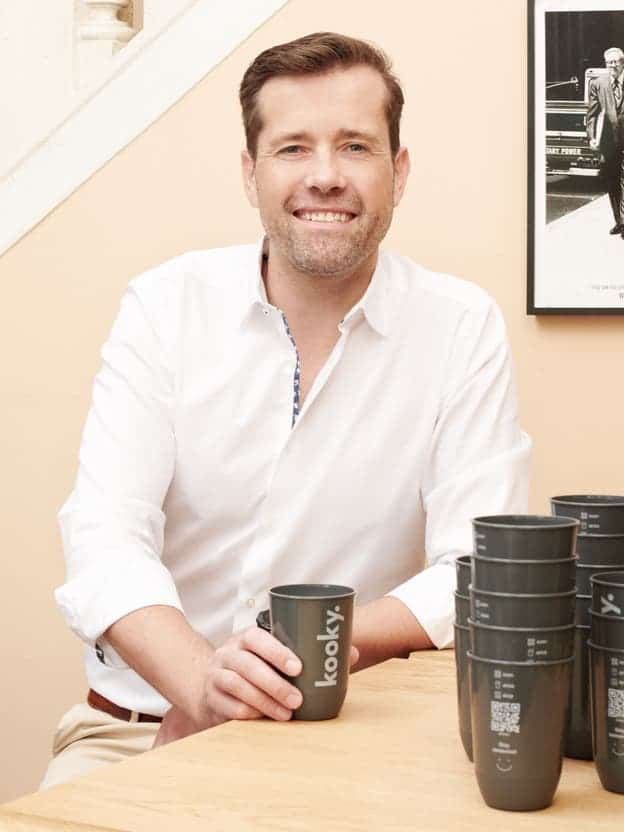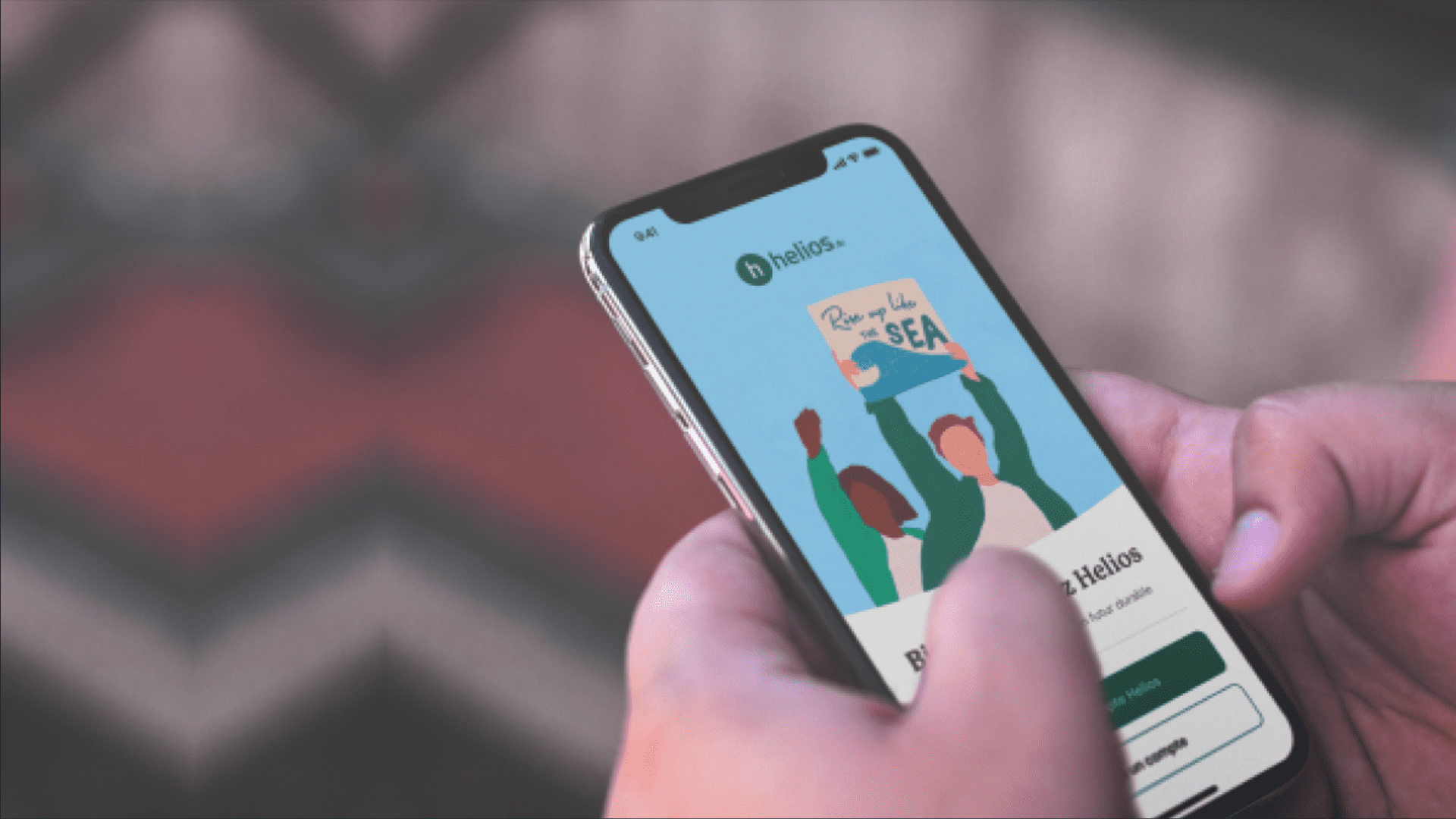kooky has developed a system of reusable cups combined with IoT technology. But the key to replacing disposable cups is a system that balances the interests of all stakeholders, explain co-founders Torge Barkholtz and Maximilian Zott.

Co-founder and CEO, kooky
Torge Barkholtz co-founded kooky with Maximilian Zott and Dmytro Boguslavskyy in 2021. kooky has developed a reusable takeaway infrastructure targeting retail chains and large institutions. It consists of smart cups and small drop-off boxes. Previously, Torge was responsible for setting up the Swiss business of Käfer gourmet food and was CEO of a micro-mobility startup named Circ in Switzerland.

Co-founder and COO, kooky
Maximilian Zott has a professional background in supply chain management and logistics. He was responsible for Gorillas’ successful rollout in Munich before he co-founded kooky.
A staggering 1.6 billion disposable cups are thrown away every day, which corresponds to more than 5000 tons of plastic waste. With its smart reusable cups that incorporate RFID technology, drop-off boxes and customer app, kooky wants to tackle this big problem. But why is there no widely available reusable cup system yet?
Max: When you want to reach a large number of people, you need to build a balanced system that takes the interest of different stakeholders into account. You cannot force extra work like manually collecting deposit payments on them. They also don’t want to take back cups they didn’t sell. The logistics necessary for a functioning circular system simply weren’t in place. Torge and I met at startup Naki Power which rented out power banks on the go to consumers. I worked for food delivery startup Gorillas, Torge was a co-founder of micro-mobility startup Circ. We have looked at the problem I mentioned in detail and were convinced that with our experience, we could set up a system that is practicable and will gain acceptance. And now, the technology is ready. You couldn’t have set up this system a few years ago.
How does kooky work?
Max: The good thing about our system is that we don’t need to change customers’ habits. They drink their beverage in a kooky cup that has an RFID chip inside and once they’re done, scan the QR code printed on it and throw it away in one of our drop-off boxes to get their deposit back in a digital wallet. We have developed the technology that tells us when a box is full and when it is profitable to empty it. Our “green ninjas”, as we call them, collect the cups by bike. We provide the washing infrastructure by utilizing the unused capacity of existing central locations and bring back the clean cups to our partners. We can tell you how many times a cup has already been used. That’s essential because reusable cups only have an ecological advantage over disposable ones after 22 washing cycles. The transparency we can provide about the ecological impact is very important for us and our partners. We’re also the only provider that can handle branded cups. For some of our partners, for example, the specialty coffee shop ViCAFE, this out-of-home advertising aspect is very important. It is also key for us to partner with the big players in the takeaway industry. The end customer doesn’t need to know they’re using the kooky infrastructure, and they might not care. What they care about are simplicity and the environment.
You started in 2021 and have already convinced the Swiss railway company and other important players such as several brands of retail giant Valora. The kooky system is available in Zurich and Basel. How do you plan to expand to other cities?
Torge: We concentrate on larger cities first and will expand to Vienna and cities in Germany soon. The first step of opening up a new city is to partner with universities and big enterprise customers. University students are first movers, they care about sustainability and are comfortable with technology. If they are convinced, others will soon follow. The cooperation with the Swiss railway company gives us great visibility, as hundreds of thousands of passengers see our drop-off boxes every day. There is great momentum also from enterprise customers that genuinely care about the environment. A pharma client in Basel introduced kooky on their campus with the goal to reduce the 4.5 million disposable cups they use per year. The Zurich University of the Arts has banned disposable cups on their campus entirely, they save 1300 disposable cups per day now. That is possible only because our reusable cups are as simple to use as disposable cups.

Invest in Startups
As one of Europe’s most active venture capital investors, we grant qualified private investors access to top-tier European startups. With investments starting at EUR/CHF 10’000, you can build your own tailored portfolio over time and diversify across stages and sectors.
Wouldn’t it be even better if all these places just provided their own ceramic cups?
Torge: That would be the ideal solution, but it is impractical. If you’re a big manufacturing company that uses 10’000 cups per day, or a hospital that uses 3000, where are you going to store all of them? The cost of theft and breakage would be substantial. People are mobile, they want to take their cup to the park or to the train station.
What about the people who are too much in a hurry to learn about these reusable cups or simply don’t care?
Torge: We’re making switching very easy and we’re really impressed by the positive feedback we get from all sides. It’s a stark contrast from micro-mobility. Not everyone uses a scooter, and people either love them or hate them. But almost everyone drinks coffee or tea. Our system is easy to understand and our cups are getting a lot of sympathy from the clients. If you think about the mountains of waste that they help reduce, it is obvious why.
Written by
WITH US, YOU CANCO-INVEST IN DEEP TECH STARTUPS

Verve's investor network
With annual investments of EUR 60-70 mio, we belong to the top 10% most active startup investors in Europe. We therefore get you into competitive financing rounds alongside other world-class venture capital funds.
We empower you to build your individual portfolio.
More News
28.03.2022
“The microbiome offers a completely new toolbox“
With the Sencyr brand, biotech startup S-Biomedic has recently launched its first consumer product, a probiotic skin cream to treat acne. Acne is a market worth USD 4 billion. In this interview, Co-Founder Veronika Oudova explains why S-Biomedic's approach is completely new.
17.03.2022
“Women need to be empowered to try startup investing”
As General Counsel, Odile Gastaldo was part of the core team that built up French telecom provider Neuf Cegetel from scratch to one of Europe’s biggest IPOs in 2006. She loves investing in startups and says women can overcome their self-doubt when it comes to investing.
16.03.2022
“We can do things differently when it comes to banking “
Neobanks have revolutionized banking with their digital products, which have since become benchmarks for other banks. Now the market is ready for an environmental revolution in banking services, says Julia Ménayas, co-founder of Helios.
Startups,Innovation andVenture Capital
Sign up to receive our weekly newsletter and learn about investing in technologies that are changing the world.



